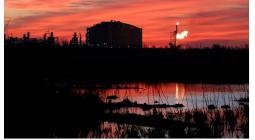Majority of US voters support climate litigation against big oil, poll shows

As US communities take big oil to court for allegedly deceiving the public about the climate crisis, polling shared with the Guardian shows that a majority of voters support the litigation, while almost half would back an even more aggressive legal strategy of filing criminal charges.
The poll, which comes as the world’s first-ever criminal climate lawsuit was brought in France last week, could shed light on how, if filed, similar US cases might be viewed by a jury.
The 40 existing US lawsuits against major oil companies, filed by cities and states, are based on civil charges such as tort law and racketeering protections. But last year, the consumer advocacy non-profit Public Citizen proposed also filing criminal charges – most notably, homicide – against the companies.
Big oil, the argument goes, knew pollution from the use of fossil fuels could have lethal consequences and yet still fought to delay climate action, which could be considered grounds for charges of reckless or negligent homicide. Asked for comment about the legal theory last year, the American Petroleum Institute, the top US fossil fuel lobby group, said that “the industry has achieved its goal of providing affordable, reliable American energy to US consumers while substantially reducing emissions and our environmental footprint”.
The seemingly radical idea has received “real, serious interest” from several district attorneys’ offices, said Aaron Regunberg, senior policy counsel with Public Citizen’s climate program. But it has also garnered some skepticism.
To see how the scheme plays with ordinary Americans, Public Citizen teamed up with progressive polling firm Data for Progress to survey 1,200 likely US voters. Conducted earlier this month, the poll was weighted to be representative of likely voters by age, gender, education, race, geography and voting history.
Asked if fossil fuel companies “should be held legally accountable for their contributions to climate change”, 62% of voters said yes, suggesting majority support for the existing civil lawsuits against oil companies. That included 84% of Democrats, 59% of Independents and 40% of Republicans. The results confirm a majority opinion suggested by earlier national and state polls.
“[V]oters strongly want to see companies held accountable for their harmful actions,” said Grace Adcox, senior climate strategist at Data for Progress from the organization and advocacy group Fossil Free Media.
The poll went on to explain that while oil companies are already facing civil lawsuits, some climate advocates have also “proposed criminal prosecutions against these companies”.
It asked: “Knowing what you do now, do you support or oppose criminal charges being filed against oil and gas companies to hold them accountable for deaths caused by their contributions to climate change?” In response, 49% of those surveyed said they would “strongly” or “somewhat” support the effort, compared with 38% who said they would not. The results indicate that though the idea is new, it may not be too “out there” for many Americans, said Regunberg.
Of Democrats, 68% said they would back the idea, which Regunberg said was “huge”, especially because Democratic districts are much more likely to bring such legal action against the fossil fuel industry. He was “surprised”, he said, to find that the idea received support from nearly a third of Republicans, at 32%.
“A significant number of Republicans would support these prosecutions, even if none of their party’s leaders have the courage to buck their fossil fuel donors,” Regunberg said.
Chesa Boudin, former district attorney from San Francisco, which sued big oil in 2017, has expressed interest in Public Citizen’s legal theory.
Boudin, who was elected on a progressive agenda, said the poll was not just a useful way to judge support for criminal climate litigation, but could also show how potential jurors might view the cases.
“It gives you an indication of what a cross-section of citizens on a jury might do with this kind of evidence,” said Boudin, who was in 2022 removed from office amid conservative backlash.
Bringing criminal charges against big oil would come with major challenges at every step, experts say, from a lack of political will, to scarce resources in public prosecutors’ offices, to potential difficulties in proving causality.
Building political support for the projects may also not be easy, but Adcox of Data for Progress said the poll shows it could be possible.
“These national findings show these cases may be able to earn popular support, particularly in blue jurisdictions,” she said.
Oil companies have yet to face criminal climate-related charges in the US. But last week, eight victims of extreme weather and three NGOs filed a criminal case against the French oil company TotalEnergies, alleging its fossil fuel exploitation has contributed to deadly climate disasters. In the US, energy companies PG&E and BP have previously been charged with homicide. (Both companies pleaded guilty and paid penalties and fines worth billions of dollars.)
Because it relies on precedent, “the law is an inherently backward-looking, conservative institution”, said Boudin. That can make it difficult to use new legal theories.
“And yet the law does change and evolve and grow,” he added. “The fact that this hasn’t been done before may lead many to say, well, it can’t be done, there’s no precedent. But there was no precedent for anything until there was.”





